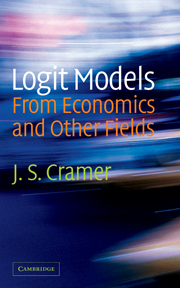Book contents
- Frontmatter
- Contents
- List of figures
- List of tables
- Preface
- 1 Introduction
- 2 The binary model
- 3 Maximum likelihood estimation of the binary logit model
- 4 Some statistical tests and measures of fit
- 5 Outliers, misclassification of outcomes, and omitted variables
- 6 Analyses of separate samples
- 7 The standard multinomial logit model
- 8 Discrete choice or random utility models
- 9 The origins and development of the logit model
- Bibliography
- Index of authors
- Index of subjects
6 - Analyses of separate samples
Published online by Cambridge University Press: 11 January 2010
- Frontmatter
- Contents
- List of figures
- List of tables
- Preface
- 1 Introduction
- 2 The binary model
- 3 Maximum likelihood estimation of the binary logit model
- 4 Some statistical tests and measures of fit
- 5 Outliers, misclassification of outcomes, and omitted variables
- 6 Analyses of separate samples
- 7 The standard multinomial logit model
- 8 Discrete choice or random utility models
- 9 The origins and development of the logit model
- Bibliography
- Index of authors
- Index of subjects
Summary
In Section 3.2 we have described the data as resulting from a series of laboratory experiments or from sampling a real population. In either case they are generated by a single process and form a single entity, even though the elements differ in outcome and covariates. This view is now abandoned and the data are distinguished by outcome and treated as separate groups, or even collected as two distinct samples. In discriminant analysis the data are regarded as a mixed sample from two different populations. We next consider trimming a single sample by discarding observations with the more numerous outcome, which is equivalent to drawing separate samples for each outcome. Finally we briefly examine case-control studies, which are the ultimate example of using separate samples.
At first sight it must make a difference whether the data are a single sample from a mixed population or two separate samples from different outcome groups. The logit model surprisingly applies in either case.
A link with discriminant analysis
Discriminant analysis is a statistical technique for classification and selection. In its simplest form (which is the only form considered here) it starts off from the assumption that the sample observations are drawn in proportions ⋋ and 1 − ⋋ from two populations, groups or classes, labelled 1 and 0.
- Type
- Chapter
- Information
- Logit Models from Economics and Other Fields , pp. 88 - 103Publisher: Cambridge University PressPrint publication year: 2003



